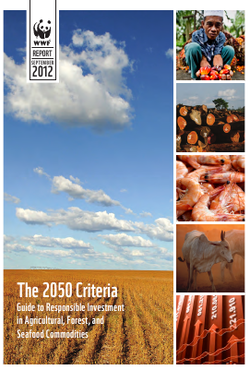
Responsible Investor | September 25th, 2012
Comprehensive guide to responsible investing in commodities launched by WWF
Major new “field guide” for investors
Environmental non-governmental organisation (NGO) the World Wildlife Fund has unveiled a comprehensive guide to responsible investing in commodities.
It’s designed as a “field guide for mainstream investors” to help them identify responsible companies and projects in the agricultural, forest and seafood industries.
A key feature is a set of key performance criteria for identifying responsible practice, helping to mitigate the primary sources of environmental and social risk for investors in the sectors.
The 95-page report – The 2050 Criteria Guide to Responsible Investment in Agricultural, Forest, and Seafood Commodities – addresses 10 commodity sectors: aquaculture; beef; cotton; dairy; palm oil; soy; sugar; timber, pulp, and paper; wild-caught seafood; and bioenergy.
The guide – backed by Swiss banking giant Credit Suisse – also aims to contribute to “improved risk adjusted returns” for investors as well as help them manage business and reputational risks.
“If business and society are to make the shift from the 20th-century model of unsustainable production and consumption to a 21st-century model of sustainability, the front lines are to be found in agricultural fields, at the edge of the forests, and in fishing grounds around the world,” says John Tobin, Credit Suisse’s Global Head of Sustainability Affairs, in a foreword. The guide was a “tangible framework” to evaluate companies.
“I hope this publication creates a new baseline and catalyzes finance and private sector alignment to confront the challenges of sustainability on a planet of finite resources,” added Jason Clay, Senior Vice President of Market Transformation at WWF.
The report acknowledges existing financial sector initiatives like the UN Principles for Responsible Investment, the Equator Principles, the UN Environmental Program Finance Initiative, the Natural Capital Declaration as well as the new Principles for Responsible Investment in Farmland developed by a group of major institutional investors.
But it says: “However praiseworthy, commitments by the financial sector have thus far been insufficient to reshape the playing field.”
The public compacts, the WWF says, have not always translated into action – leaving signatories open to risks and reputational attacks.
“Commitments by the financial sector have been insufficient”
The WWF said: “If it executes properly, a financial institution can effectively position for enhanced and responsible performance in these sectors of growing importance.
“Indeed, as price volatility, resource scarcity, public criticism, regulation, and shifts toward transparency all escalate, financial institutions that move in lockstep with industry leaders will likely stand to benefit.”
Separately, investment consultant Callan Associates has issued a research paper ‘Investing in Farmland—Looking to Buy the Farm’, arguing that low equity returns, inflation unease and global demand for food is driving interest in agriculture investment.
WWF Anouncement












